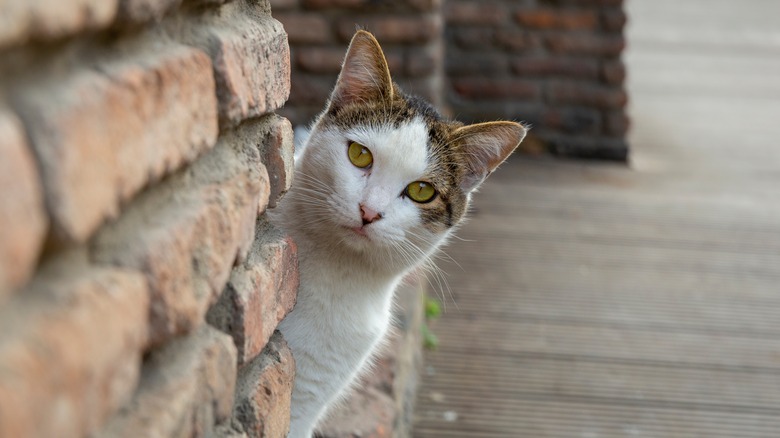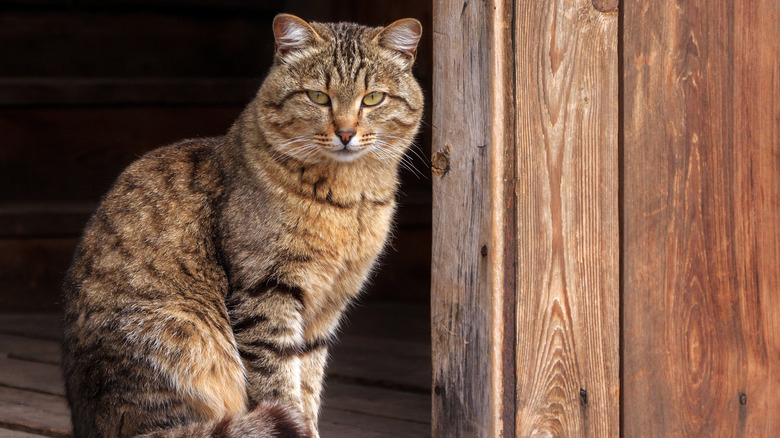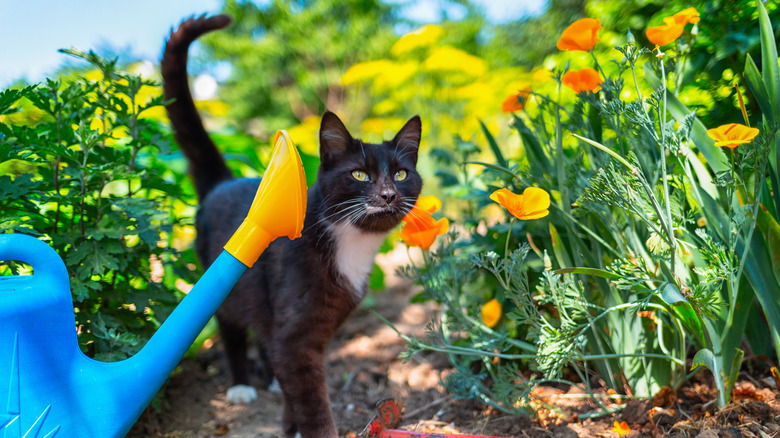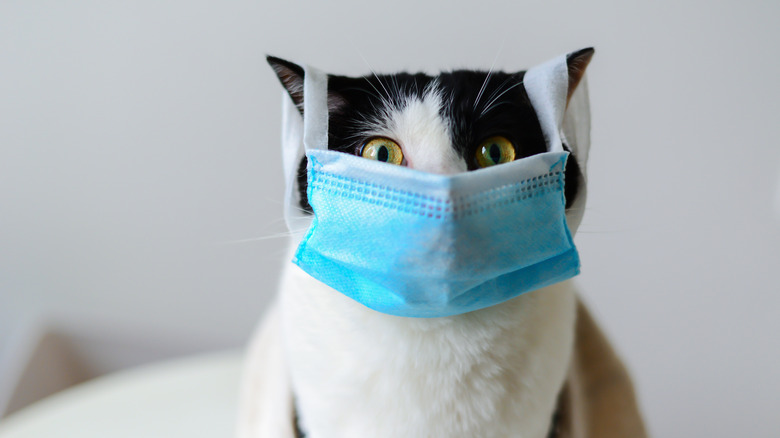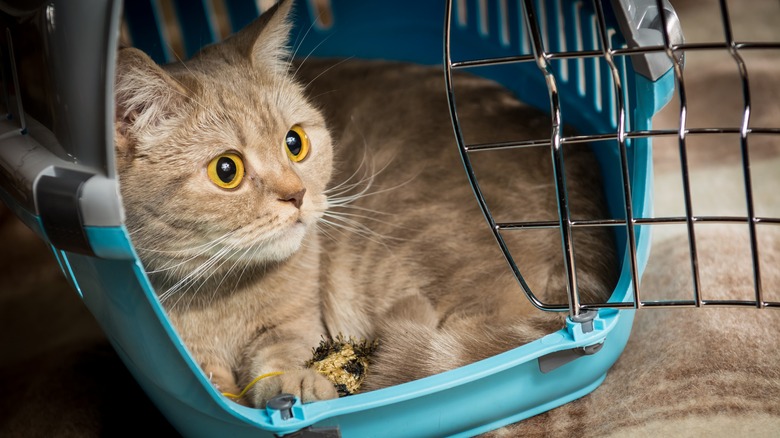How To Get Rid Of Unwanted Stray Cats
We may receive a commission on purchases made from links.
Cats can make wonderful furry additions to your family. In fact, they are one of the most favorited household pets in the United States. Approximately 25% of U.S. households have at least one cat due to their loyal yet fierce ability to make amazing household companions, according to Good Housekeeping. Although cats are a favored pet, stray cats tend to cause a lot of trouble around neighborhoods. From noisy catfights to litter box gardens, stray cats can have a very unwelcoming presence around your home.
The issue, however, runs deeper because it is still unlawful and morally wrong to intentionally harm or kill them just because they're a nuisance. We want to keep our homes and yards free of stray cats, but we don't want to hurt them. Fortunately, that is not a difficult task. With the following variety of tips and tricks, you can easily ward off stray cats, keeping your yard and home exactly how you want it to be.
Remove shelter and food source
All animals need shelter and food to survive; therefore, stray cats may be attracted to your property due to open shelter or access to food. Both of these elements make your property a breeding ground for stray cats. To rid your property of these attractants, start by locating secure places that may have open access to small animals. Examples of this include your garage, shed, or even underneath your porch or deck. The Spruce recommended locating these places and creating barriers that cut off access to these areas, keeping strays from inhabiting them.
Similarly, stray cats are attracted to a food source; therefore, it's important to keep trash cans tightly sealed and outside grills clean to avoid attractive smells. If you have pets, also avoid feeding them in outside spaces of your home, or be sure to clean up all leftovers after your pet has finished eating. Never leave food out consistently because it could attract unwanted animal guests.
Create an unwelcoming environment
Cats are animals that love their comfort. They love lounging around in comfortable environments; therefore, if your yard provides particular areas of comfort, it could be attracting these unwanted visitors. You can start by getting rid of or separating them from soft and flat ground. Fences and garden stakes alone can prevent cats from reaching the area they desire. If you already have a fence around your yard, you can consider adding spiked tips to it, preventing cats from climbing or jumping over your fence, as suggested by Pet Shop. Replacing soft landscaping with stones or pebbles can also stop a cat from wanting to lounge about your yard (per Catsupandmustard).
Flowerbeds are a particular hotspot for cat visitors; therefore, The Spruce recommended placing chicken wire over the soil, making the ground uncomfortable for cats to step on or dig in. Placing eggshells or sharp rocks in your flowerbed can also ward cats away from your property.
Natural cat deterrents
Like all pests and rodents, cats also have natural weaknesses that can be used to wean them away from your property. Just like catnip can attract a cat to you and your yard, there are certain plants and scents that can repel cats away from your yard, as well. Catsupandmustard suggested adding rue, lavender, pennyroyals, coleus canina, thyme, or any type of citrus plant to your garden to keep cats away. When added to your yard, it is said to give off scents that cats dislike, ultimately repelling them away (per Dengarden).
Besides plants, cats can also be repelled by typical household items like brewed coffee grounds, human hair, and even citrus fruit peels. These items mess with the sensitivity of a cat's senses, pushing them out of the area. Placing these items in your yard and garden also have a variety of advantages regarding the health of your soil.
Neutralize the scent
If stray cats are drawn to a specific area, it may be because they are attracted to a scent that is lingering there. To actively keep a cat out of an area like this, the best option is to neutralize the smell. Tips Bulletin introduced an easy homemade solution that can do just that. By spraying this solution in a specific area, you are neutralizing the scent that is stationed there, discouraging the cats from going to that area. If stray cats are attracted to your garage or shed, you can easily spray this solution throughout the area to prevent their entrance. Before spraying onto sensitive surfaces, however, test the solution on a piece of fabric to ensure it will not stain.
Other than apple cider vinegar, this solution can also be made with essential oil, particularly lemongrass, peppermint, lavender, or citronella oil. These scents are said to be disliked by cats; therefore, they can also effectively repel cats from a specific area.
Animal repellent
If you're looking for a more potent repellant that works in larger, outdoor areas, there are a variety of store-bought repellents to choose from that work for a wide range of animals, including cats. Havahart shared that most animal repellents are pepper-based solutions that irritate the smell and taste senses for animals, causing them to avoid areas at which the repellent is placed. There is no poison in these solutions; therefore, they are entirely safe for the animals.
Safer Brand recommended their animal repellent products, which are made with all-natural ingredients that safely and humanely drive animals away from your yard and home. These products come both in a liquid and granulated form for multi-purpose needs. The granules of repellent can be sprinkled around your yard to create barriers where animals stay clear from. The liquid repellent can be sprayed directly onto specific surfaces to better target these areas as well.
Electronic repeller
Without causing harm to any animals or wildlife, you can use an ultrasonic animal repeller to keep cats, as well as other animals, out of your yard. Family Handyman explained that this device works by sending out high-frequency sound waves that cats and other animals are particularly sensitive to. The sounds are usually not able to be heard by humans. Along with the noise, they also send out flashes of light to further chase animals away.
Bird-X's Ultrasonic Animal Repeller is one example of this type of repeller. It is a small and discreet device that can be mounted anywhere in your garden and covers up to four thousand square feet of land in front of it. The sound waves the device gives off are also adjustable and silent to most humans. However, you must be aware of other animals, such as your own pets, roaming your yard when this device is on.
Deter with water
When all else fails, you can simply try water to repel stray cats from your yard. It is no mystery that cats hate water. You rarely, if not ever, see a cat enjoying a swim or playing in the sprinklers. Dengarden mentioned several options in which you can use water to simply and naturally keep cats out of your yard.
If your yard has a sprinkler system, you can schedule your sprinkler to activate at certain periods throughout the day. Whenever you notice a schedule or common time period at which cats roam your yard, set your sprinklers to switch on during that time. Motion-activated sprinklers are another effective option. If you don't have a sprinkler system, a water gun can work. Whenever you see a cat roaming your yard, simply spray them down with the water. Once a cat gets soaked from the same property one or two times, they quickly learn not to return.
Trap-Neuter-Release program
Especially for neighborhoods that have difficulty dealing with a large number of stray cats, participating in a Trap-Neuter-Release program can make a big difference for both the cats and your community. Alley Cat Allies states that this program is a humane solution concerning cat populations throughout communities. Humanely, they catch cats, neuter or spay them, and vaccinate them before releasing them back to their outside home. Once the cat has gone through the program, they will also be ear-tipped, which is the universal signal for being a neutered and vaccinated stray.
Sometimes stray cat populations can skyrocket within certain communities, but it's inhumane to round up and kill stray cats. Spaying and neutering cats is an alternative that decreases cat populations by restricting a cat's ability to reproduce. Within the same program, the cats are also vaccinated, which helps against the diseases and pests that might be getting passed around their animal community. It provides a balance between the health of the cats and concern from the community.
